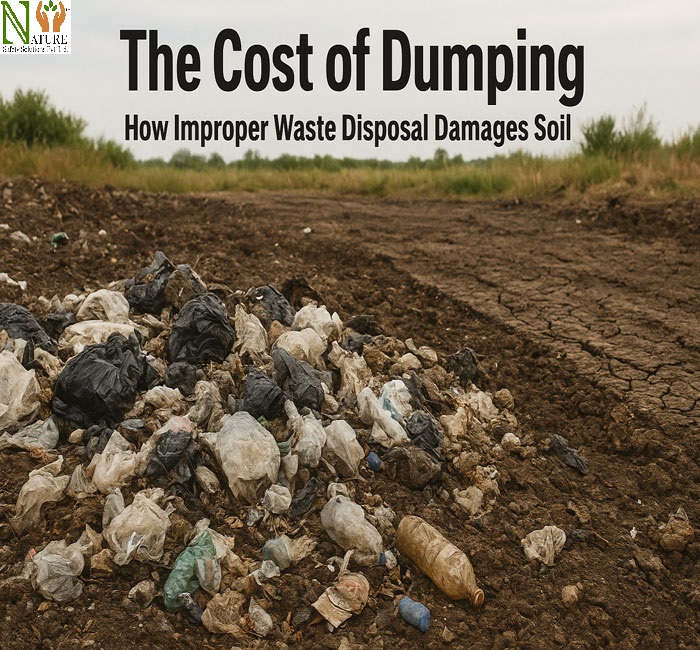Soil is one of the planet’s most important natural resources. It sustains plant life, supports ecosystems, and is the foundation for agricultural production. Yet, it is under constant threat due to improper waste disposal. This growing problem affects the environment, human health, and long-term sustainability.

Understanding Improper Waste Disposal
Improper waste disposal occurs when garbage and industrial byproducts are discarded without following safe, regulated methods. This includes dumping household trash in open areas, releasing untreated industrial waste, and allowing agricultural chemicals to seep into the ground. Unlike sanitary landfills or controlled recycling systems, these practices lead to uncontrolled contamination of the soil.
How Waste Disposal Damages Soil
1. Chemical Contamination
Household waste often contains plastics, batteries, paints, and electronic items. These release toxic chemicals such as lead, mercury, and cadmium. When dumped directly on the ground, these substances seep into the soil, altering its composition and making it unsuitable for plant growth.
2. Heavy Metals in the Soil
Industrial waste from factories often contains heavy metals. Over time, these accumulate in the soil, making it toxic to plants and harmful to humans who consume crops grown there. For example, lead contamination can cause developmental problems in children and neurological issues in adults.
3. Disruption of Soil Microorganisms
Healthy soil is rich in beneficial microorganisms that help recycle nutrients and maintain fertility. Chemical pollutants kill these organisms, reducing soil health and productivity. This leads to reduced agricultural yields over time.
4. Plastic Pollution
Improper disposal of plastic waste creates a physical barrier in the soil, reducing water absorption and air circulation. This not only harms plant roots but also slows down soil regeneration.
Wider Impacts of Soil Damage
When soil is contaminated, the damage extends far beyond agriculture. Pollutants seep into groundwater, affecting drinking water sources. Toxic soil also impacts wildlife habitats, reducing biodiversity. Economically, degraded soil lowers agricultural output, leading to increased food prices and rural poverty.
Preventing Soil Damage from Waste
- Segregating Waste at Source – Separate biodegradable, recyclable, and hazardous waste.
- Promoting Recycling and Composting – Reduce the amount of waste that ends up in landfills.
- Strict Industrial Waste Management – Enforce regulations to ensure industries treat waste before disposal.
- Public Awareness Campaigns – Educate communities on the environmental cost of dumping.
- Adopting Sustainable Practices – Use eco-friendly materials and reduce single-use plastics.
The Role of Individuals and Communities
Governments and industries play a major role in waste management, but individuals are equally important. Simple steps like refusing single-use plastics, disposing of e-waste through proper channels, and composting kitchen waste can have a significant impact. Community-led clean-up drives and awareness programs also encourage responsible waste handling.
Also read:-
